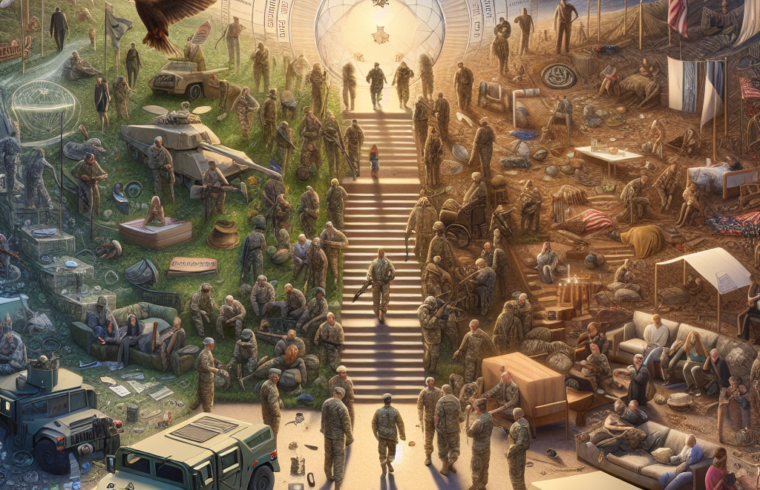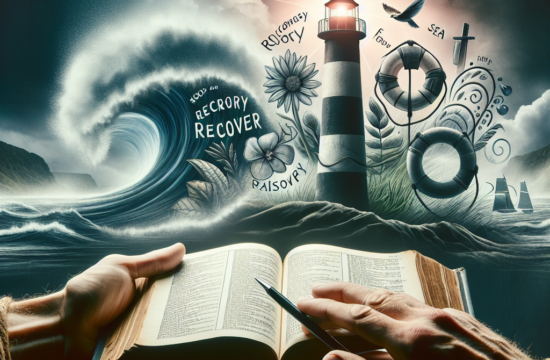==> Thank you for reading this post! Click Here If you are looking for support and Victory over PTSD.
Understanding Trauma & Its Effects
What Is Military Trauma?
When I first began to grasp the idea of military trauma, it was like stepping into a new world. It wasn’t just about physical injuries, but the psychological battles that linger long after the uniform comes off. Trauma, for us veterans, often means living with haunting memories and the overwhelming weight of loss. It took me a while to truly understand how deep the effects of trauma can go—impacting relationships, job performance, and even everyday life.
I remember sitting in on my first support group session, feeling skeptical yet hopeful. The stories shared were raw and relatable. It was here that I learned trauma isn’t a one-size-fits-all situation; it manifests in various ways for each individual. Recognizing that was the first step towards acceptance.
As I dove deeper into this subject, I realized that labeling experiences was vital. Whether it’s PTSD, anxiety, or depression, understanding the specifics of our trauma helps create a tailored healing approach. This brings us to why it’s so important to address military trauma with compassion and understanding.
Recognizing Symptoms
Identifying symptoms of trauma became a game-changer for me. Initially, I brushed off my sleepless nights as “just a phase.” But with time, I learned that symptoms can range from flashbacks and nightmares to being easily startled or experiencing irritability. The more I understood, the more I felt empowered to seek help.
One of the most striking symptoms I faced was emotional numbness. Sometimes, I would feel disconnected from reality, as if viewing my life through a foggy window. The challenge was acknowledging those feelings without feeling ashamed. I found that talking with fellow veterans who faced similar struggles was incredibly validating. It reminded me that I wasn’t alone in this journey.
Educating myself further on these symptoms allowed me to spot them in others as well. I could support my brothers and sisters in arms—encouraging them to seek help, fostering open conversations about emotional struggles. This created a safe space for us to share our stories and experiences.
The Importance of Seeking Help
Seeking help was probably one of the toughest battles I faced. I remember that feeling in my gut—the fear of being vulnerable or judged. It took me a long time to understand that asking for help is not a weakness, but rather a courageous step towards healing. I’m here to tell you, it’s okay to reach out.
Finally, I took the plunge and found a professional who specialized in military trauma. The idea of sitting across from someone, pouring my heart out, scared me. But, that first session opened a whole new world for me. It was like lifting a weight off my shoulders to speak about things I had buried deep inside.
Through therapy, I learned coping strategies that I could apply in my daily life. From mindfulness to grounding techniques, these tools not only helped me in my recovery but also built a different outlook on life—a more hopeful one.
Building Support Systems
Finding Community
Finding a community of veterans like you is so crucial. When I began connecting with others who shared similar experiences, it was like finding home again. Starting out, I joined a local veteran support group. At first, I was hesitant to become vulnerable. But let me tell you, that vulnerability transformed me.
Being surrounded by people who understood my struggles made the world of a difference. It allowed for conversations that explored everything from our memories of service to the daily challenges of reintegration into civilian life. With every meeting, I discovered that healing isn’t just an individual journey—it’s a collective process.
Additionally, shared activities, like group hikes or community service, offered a fun distraction. The bonds we formed became an integral part of my healing process. I realized that mutual support and understanding play vital roles in overcoming trauma together.
Strong Relationships
Building strong relationships with family and friends also proved to be beneficial for my healing journey. Early on, I didn’t realize just how much I was pushing people away. I thought isolating myself would protect them from my pain, but in reality, it did the opposite.
Through honest conversations, I started to invite my family into my world. Sharing experiences and expressing emotions with them helped not only to strengthen our bonds but also facilitated their understanding of what I was going through. It felt comforting to know they were by my side.
I’ve learned to appreciate the little moments—movie nights, dinners, and heartfelt talks. These connections feed our souls and restore our spirits. It’s about recognizing that support can come in various forms, even from the people closest to you.
Professional Support Networks
Acquiring professional support is paramount in navigating the complexities of trauma. I began to seek out mental health professionals with experience in treating veterans. Initially, I thought I could do it all alone, but I soon learned that having experts on my side made all the difference.
Through therapy, I explored different treatment methodologies—from cognitive behavioral therapy to art therapy. Each session varied, but they all offered invaluable insights into my healing journey. I often found myself in tears, laughing, and discovering new parts of myself I had long forgotten.
Organizations that focus on veteran support often provide therapy options, workshops, and resources. I highly encourage exploring what’s available in your community. It is so worth it, trust me. Those resources became my lifelines.
Embracing New Perspectives
Learning from the Past
Embracing new perspectives can be challenging, especially for veterans who have seen and endured unimaginable things. I often find myself reminiscing about my service, sometimes filled with anger or regret. However, learning to view my past through a different lens has been transformative.
Instead of defining myself solely by my experiences, I’ve tried to acknowledge them as part of my growth. Each tough moment came with lessons that helped mold my character. It’s essential to recognize these transitions and not let my past define who I am today.
An essential part of my coping strategy became writing—jotting down memories and feelings shaped my journey. It served as an emotional release and as a reminder that I am not destined to remain trapped in those dark moments.
Get Support and Help with Recovery! Visit us for more Information and Support
Adapting to Change
Change is something we veterans often struggle with. Transitioning from military to civilian life has its challenges, and I struggled a lot in the beginning. I had to learn how to redefine my identity, and it wasn’t easy. The thought of starting fresh and embracing new roles was intimidating.
Gradually, I learned to adapt. Joining workshops and educational courses helped me explore new interests and career paths. It was refreshing to dive into areas I never had the chance to explore during my military service. And with each new skill I acquired, my confidence grew.
The more I embraced change, the more I realized that life is about evolution. Change doesn’t mean losing who I was; rather, it’s about expanding into who I could become. It took time, but acknowledging this became a powerful turning point for me.
Gratitude and Acceptance
Learning to cultivate gratitude amidst adversity has been another essential lesson. It may sound cliché, but I’ve found that counting my blessings helps shift my perspective. While it was easy to get wrapped up in what I lost, I began focusing on what I still had—my health, friends, and the opportunity for growth.
I started small: keeping a gratitude journal where I would write down three things I was thankful for every night. This practice may seem trivial, but it reshaped how I viewed each day. Moving past resentment was a challenge, yet it became easier as I found value in the present moment.
Acceptance, too, plays a role. Accepting my experiences doesn’t mean I condone them; it means I recognize my reality. Through acceptance, I discovered unexpected layers of strength and resilience within me. It laid the groundwork for deeper healing.
Taking Steps Towards Healing
Setting Goals
Setting short-term and long-term goals is crucial for veterans navigating the healing journey. Initially, I treated these targets as marching orders, but over time, I learned to make them more flexible. Each step, regardless of its size, became a victory worth celebrating.
Each month, I would set achievable goals—whether that meant attending a support group, trying a new hobby, or simply reaching out to a friend. Creating milestones made the process feel less daunting and helped me track my progress, driving me toward a healthier mindset.
What’s important, though, is recognizing that setbacks may occur. It’s all part of the journey. There were moments when I didn’t meet my expected goals, but I learned to treat myself with kindness and compassion during these times. Progress isn’t linear, and that’s absolutely okay.
Integrative Healing Practices
Integrating healing practices into my routine became a game-changer. From mindfulness and meditation to yoga and exercise, these practices brought balance to my life. They became my sanctuary amidst the chaos of trauma.
It’s fascinating how something as simple as deep breathing could shift my mental space. Practicing mindfulness helped me remain present, breaking the spiral of negative thoughts. I remember my first yoga class—struggling to find balance but feeling a sense of peace wash over me. It felt like finding a part of myself I didn’t know was missing.
Meanwhile, regular exercise became my outlet for stress and anxiety. Whether it was running, cycling, or even just a walk, moving my body allowed for mental clarity. Plus, I met awesome folks who shared similar goals, which made it all the more enjoyable. The journey toward healing doesn’t have to be lonely!
Continued Education and Growth
Last but certainly not least, I realized the power of continued education in my healing journey. Whether it was reading self-help books, attending workshops, or even pursuing new academic endeavors, expanding my knowledge piqued my curiosity and offered fresh perspectives.
I’ve come to appreciate learning as a lifelong journey—not solely educational but personal as well. With every lesson, I reconnect with my sense of purpose. It creates a canvas for my experience, merging pain with positive action. When I step into the classroom or dive into literature, it feels like reclaiming my power.
Additionally, sharing my knowledge with others has also been rewarding. I began volunteering for veteran organizations, sharing my story, and assisting others on their journeys. It’s a beautiful reminder that we can heal together, creating a ripple effect within our communities.
FAQ
1. What is military trauma?
Military trauma refers to psychological injuries suffered by service members due to combat exposures, loss, or any distressing experiences during their service. It can manifest in various forms, including PTSD, depression, and anxiety.
2. How can I identify if I am experiencing trauma?
Symptoms can include flashbacks, nightmares, emotional numbness, irritability, and difficulties in relationships. If you notice significant changes in mood or behavior, reaching out for professional help is a good idea.
3. Why is it important to seek help for trauma?
Seeking help is crucial because it can guide you through understanding and managing trauma. Support from professionals lets you build healthy coping mechanisms, ultimately leading to a better quality of life.
4. How can I build a support network?
Start by connecting with local veteran organizations, support groups, or online forums. Additionally, don’t hesitate to lean on family and friends for support. Building that network fosters understanding and community, which is essential for healing.
5. What are some effective ways to cope with trauma?
Effective coping strategies include setting achievable goals, engaging in physical activity, practicing mindfulness or meditation, and educating yourself on trauma. Everyone’s journey is unique, so explore what works best for you.













